广东省深圳市 Module 4 Unit 8 From hobby to career 课件
文档属性
| 名称 | 广东省深圳市 Module 4 Unit 8 From hobby to career 课件 | 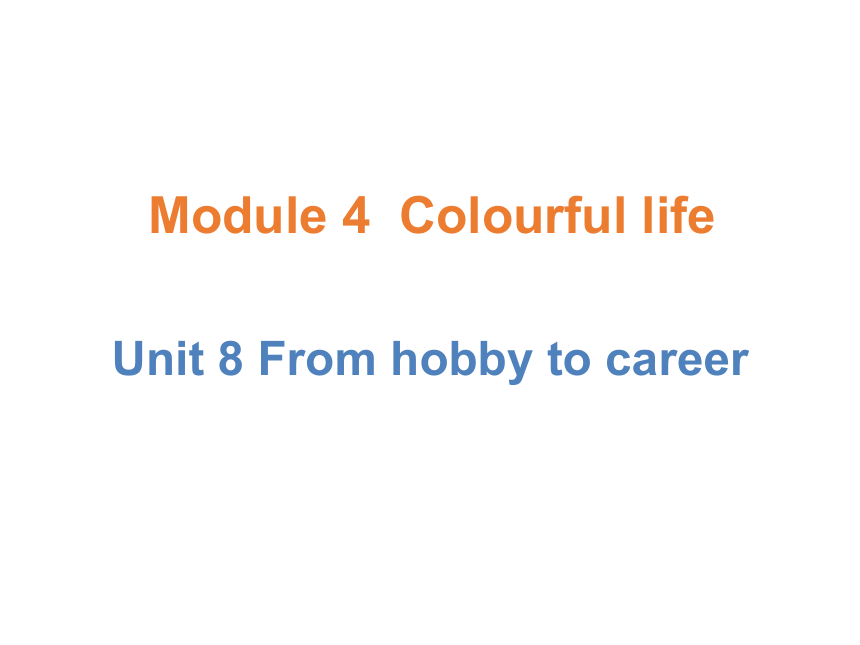 | |
| 格式 | zip | ||
| 文件大小 | 108.3KB | ||
| 资源类型 | 教案 | ||
| 版本资源 | 牛津深圳版 | ||
| 科目 | 英语 | ||
| 更新时间 | 2016-07-19 00:00:00 | ||
图片预览


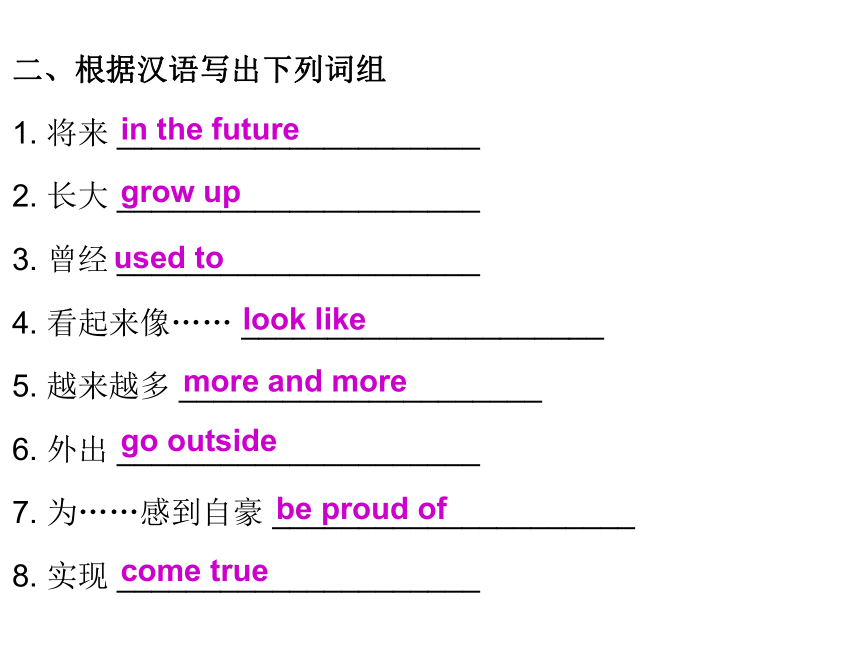
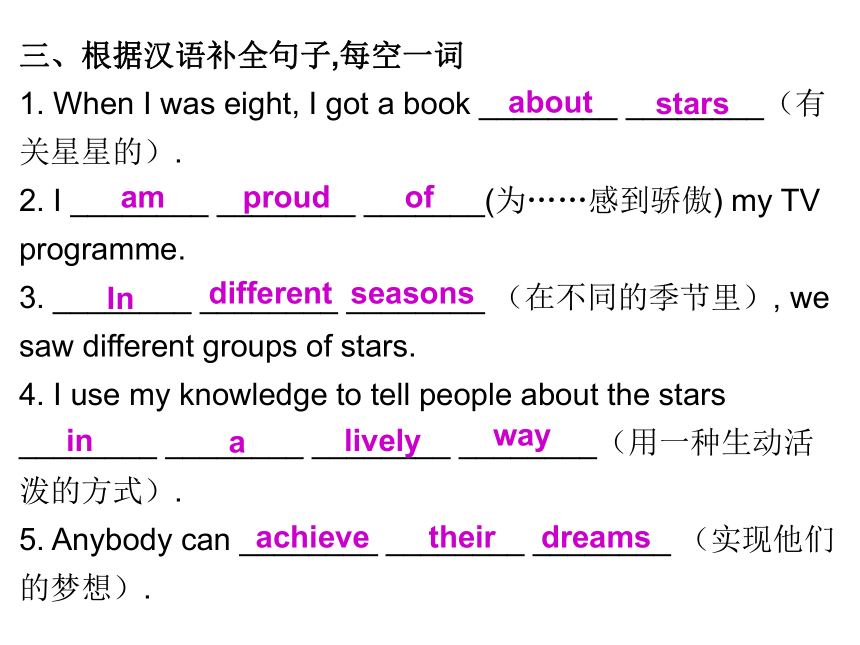
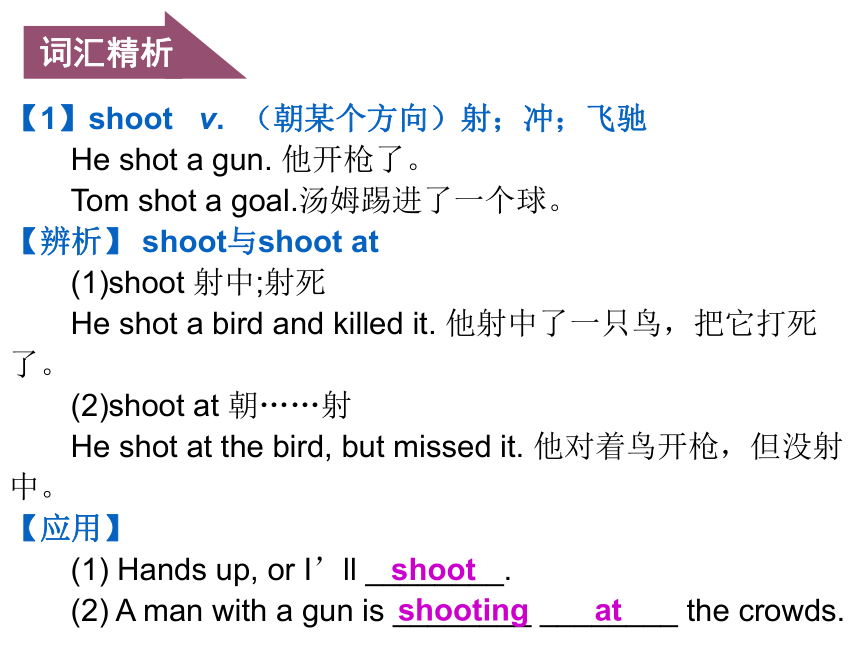
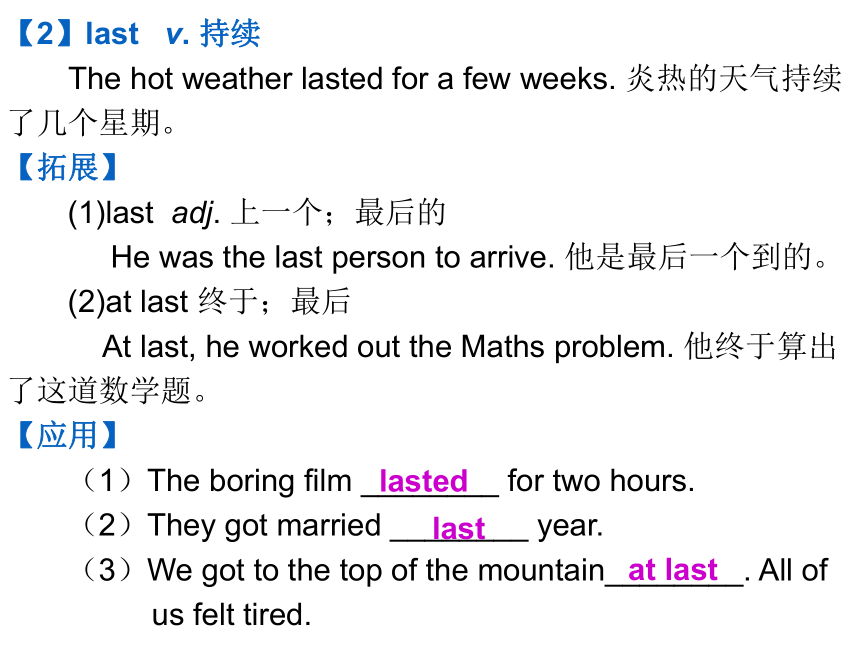
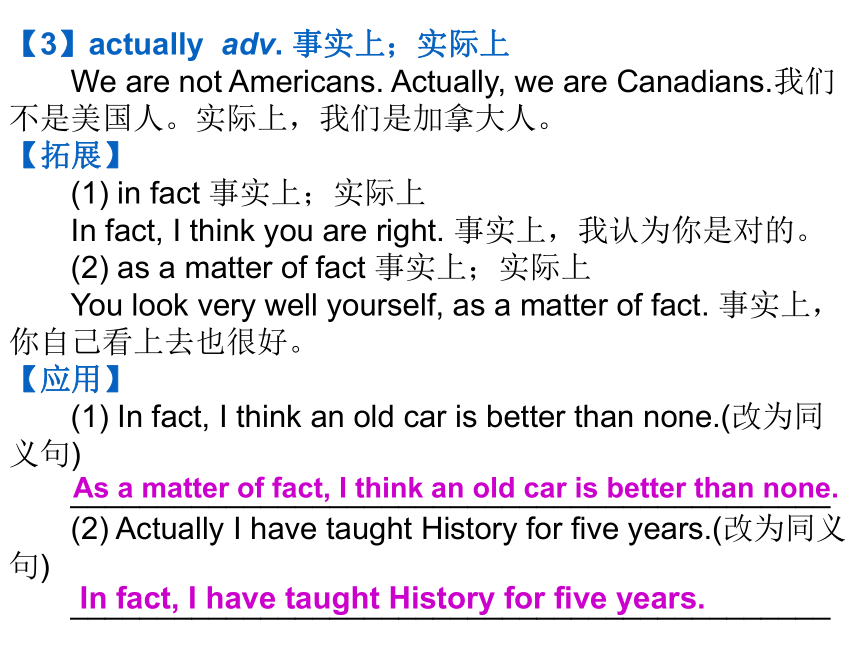
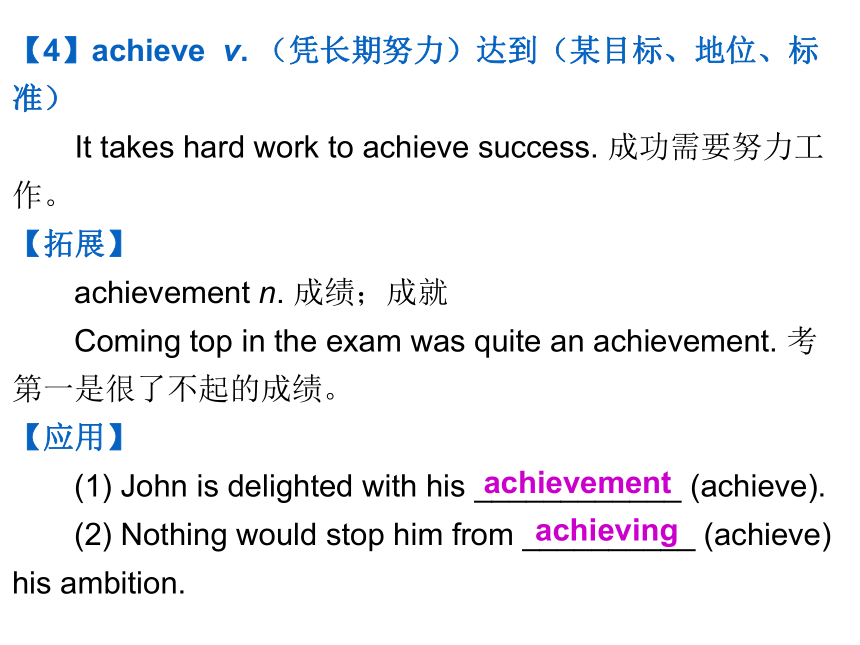

文档简介
课件26张PPT。Unit 8 From hobby to careerModule 4 Colourful life自主预习一、根据汉语写出英文单词
1. 事业 (n.) ______________________
2. 行星 (n.) ______________________
3. (朝某个方向)射,冲 (v.) ______________________
4. 知识 (n.) ______________________
5. 卫星 (n.) ______________________
6. 生动的 (adj.) ______________________
7. 事实上 (adv.) ______________________
8. 达到 (v.) ______________________
9. 持续 (v.) ______________________
10. 主持 (v.) ______________________
11. 决定(v.) ______________________
12. 独自(adv.) ______________________careerplanetshootknowledgesatellitelivelyactuallyachievelasthostdecidealone二、根据汉语写出下列词组
1. 将来 _____________________
2. 长大 _____________________
3. 曾经 _____________________
4. 看起来像…… _____________________
5. 越来越多 _____________________
6. 外出 _____________________
7. 为……感到自豪 _____________________
8. 实现 _____________________in the futuregrow upused tolook likemore and morego outsidebe proud ofcome true三、根据汉语补全句子,每空一词
1. When I was eight, I got a book ________ ________(有关星星的).
2. I ________ ________ _______(为……感到骄傲) my TV programme.
3. ________ ________ ________ (在不同的季节里), we saw different groups of stars.
4. I use my knowledge to tell people about the stars
________ ________ ________ ________(用一种生动活泼的方式).
5. Anybody can ________ ________ ________ (实现他们的梦想). aboutstarsamproudofIndifferentseasonsinalivelywayachievetheirdreams词汇精析【1】shoot v. (朝某个方向)射;冲;飞驰
He shot a gun. 他开枪了。
Tom shot a goal.汤姆踢进了一个球。
【辨析】 shoot与shoot at
(1)shoot 射中;射死
He shot a bird and killed it. 他射中了一只鸟,把它打死
了。
(2)shoot at 朝……射
He shot at the bird, but missed it. 他对着鸟开枪,但没射中。
【应用】
(1) Hands up, or I’ll ________.
(2) A man with a gun is ________ ________ the crowds.shootshootingat【2】last v. 持续
The hot weather lasted for a few weeks. 炎热的天气持续了几个星期。
【拓展】
(1)last adj. 上一个;最后的
He was the last person to arrive. 他是最后一个到的。
(2)at last 终于;最后
At last, he worked out the Maths problem. 他终于算出了这道数学题。
【应用】
(1)The boring film ________ for two hours.
(2)They got married ________ year.
(3)We got to the top of the mountain________. All of
us felt tired.lastedlastat last【3】actually adv. 事实上;实际上
We are not Americans. Actually, we are Canadians.我们不是美国人。实际上,我们是加拿大人。
【拓展】
(1) in fact 事实上;实际上
In fact, I think you are right. 事实上,我认为你是对的。
(2) as a matter of fact 事实上;实际上
You look very well yourself, as a matter of fact. 事实上,你自己看上去也很好。
【应用】
(1) In fact, I think an old car is better than none.(改为同义句)
____________________________________________
(2) Actually I have taught History for five years.(改为同义句)
____________________________________________As a matter of fact, I think an old car is better than none.In fact, I have taught History for five years. 【4】achieve v. (凭长期努力)达到(某目标、地位、标准)
It takes hard work to achieve success. 成功需要努力工作。
【拓展】
achievement n. 成绩;成就
Coming top in the exam was quite an achievement. 考第一是很了不起的成绩。
【应用】
(1) John is delighted with his ____________ (achieve).
(2) Nothing would stop him from __________ (achieve) his ambition.achievement achieving【5】decide v. 决定;判断
It’s difficult to decide between the two. 很难对这两者做出抉择。
【拓展】
(1) decision n. 决定
I don’t want to put pressure on you to make a decision, but we haven’t much time left. 我并不想催你做决定,只是我们剩下的时间已经不多了。
(2) decide to do=make a decision to do=make up one’s mind to do 决定做某事
He has decided to leave his job.
=He has made a decision to leave his job.
=He has made up his mind to leave his job. 他下决心放弃他的工作。【应用】
(1) I’ll let you know before I decide to do it.(改为同义句)
_________________________________________
_________________________________________
(2) I decided to study harder to improve my English.(改为同义句)
_________________________________________
_________________________________________I’ll let you know before I make up my mind/make a decision to do it.I made a decision/made up my mind to study harder to improve my English.【6】alone adv. 单独;独自
He went swimming alone at night. 他夜晚独自去游泳
了。
【拓展】
alone adj. 单独的;独自的;孤单的
I was alone in the classroom just now. 我刚才独自在教室里。
【辨析】 alone与lonely
(1)alone“单独的;独自的”,侧重说明独自一人,没有感彩,只表示客观的状态。
She works best of all when she is alone. 独自一人时,她工作得最好。
(2)lonely“孤独的;寂寞的”,表示主观上感到孤
独、寂寞,有较浓的感彩,指因缺少朋友、同情、友谊等所产生的一种悲伤和忧郁的感情。
I feel very lonely without my dog. 我的狗不在身边我就感觉很寂寞。【应用】
The old man lives ________ in the old house and he feels ________.(lone)alonelonely【7】in the future 将来
The boy wants to be a pilot in the future. 这男孩将来想当飞行员。
【辨析】 in future与in the future
(1)in future 从今以后;今后
I hope they will be happier in future. 我希望今后他们更幸福。
(2)in the future 将来;未来
But when we project ever in the future, we forget everything we have. 但是当我们计划尚在未来的事情时,我们忘记了自己所拥有的一切。
【应用】
(1) I want to be an artist _____________(将来).
(2) ________ (今后)I want everyone to get to work on time.in the futureIn future【8】used to 曾经;过去常常
I used to get up early and take an hour’s walk before breakfast. 我过去常常早起并且在早餐前散步一小时。
【拓展】
be used to do sth.=be used for doing sth. 被用来做某事
Knives are used to cut things.=Knives are used for cutting things. 刀被用来切东西。
【辨析】 used to与be/get used to
(1)used to “过去常常;以前曾经”,后跟动词原
形。
He used to smoke, but now he has stopped smoking.
他以前经常吸烟,但现在他戒了。
He didn’t use to smoke. 他以前没有经常吸烟。
Did he use to smoke? 他以前经常吸烟吗? (2)be/get used to “习惯”,to是介词,后跟名词、代词或动名词。
She is/gets used to getting up early. 她习惯早起。
Tom used to eat Western food, now he is/gets used to Chinese food. 汤姆以前吃西餐,现在习惯吃中餐了。
【应用】
英译汉。
(1) He used to drive to work, but now he is used to walking to work.
____________________________________________
(2) Are you used to the life here?
____________________________________________
(3) I weigh less than I used to.
____________________________________________
(4) This knife is used for cutting apples.
____________________________________________他以前常开车去上班,但现在他习惯走路上班了。你习惯这里的生活吗?我体重比以前轻了。这把刀是用来切苹果的。【9】grow up 长大
Where did you grow up?你在哪里长大的?
【拓展】
(1)grow v. 增加;生长;变成;种植;逐渐开始
She is growing into a beautiful young woman. 她渐渐成长为美丽的姑娘。
Without the Sun, nothing would grow. 没有太阳,万物不能生长。
He grew in experience. 他增长了经验。
(2)grown-up adj.成熟的 n. 成年人
She’s very grown-up. 她非常成人化。
The grown-ups applauded after the children had finished their performance. 孩子们表演完后,大人们鼓掌。【应用】
英译汉。
(1) Rice usually grows in the south of China.
____________________________________________
(2) I’d like to be a scientist when I grow up.
____________________________________________
(3) Children usually depend on grown-ups.
____________________________________________ 水稻通常种植在中国的南方。我长大后想当科学家。孩子们通常依靠大人。【10】look like 看起来像……
He looks like an old farmer.他看上去像一个老农。
【拓展】
(1)like v. 喜欢
If you like, let’s go shopping.如果你喜欢,我们去购物吧。
(2)be like 像
He is like a son to me. 对我来说,他就像我儿子一样。
(3)do as one likes 高兴怎样就怎样
I’m old enough to have the freedom to do as I like. 我已经足够大了,有权去做我自己喜欢做的事。
【应用】
(1) ________ he like swimming?
(2) What________ your school like?
(3) What does he ________ like?Doesis look语法梳理语法精讲时间状语从句
用表示时间的连词连接一个句子作状语,这样的主从复合句叫作时间状语从句。引导时间状语从句的连接词有when, as, while, after, before, since, as soon as, once, till, until等。其中when, while引导的时间状语从句有以下区别:
1. when的用法
(1) when既可指时间点,也可指时间段(即:从句动词可以是短暂性的也可以是延续性的);主从句动作可同时发生也可先后发生。
I was thin when I was a child. 当我还是个孩子的时候,我很瘦。
It was raining when I arrived. 我到达时,天正在下雨。 (2)when引导时间状语从句时,如果从句主语与主句主语相同,且从句有be动词,则从句可省略主语和be动词。
When (you are) in trouble, you can visit this man.当你有麻烦时,可以找这个人。
She is always listening to music when(she is) doing her homework. 当她做作业时,总是听音乐。
2. while的用法
(1) while只能指一段时间,从句中的动词必须是延续性动词,强调某一段时间内主句发生的动作,相当于“during the time that...”。
My mother was cooking while I was doing my homework. 当我在做作业时,妈妈在做饭。
I am safe while I am here. 我在这儿的时候,我很安全。
(2) while除了引导时间状语从句外,还引导对比关系的并列句,表示“然而”;并可在句首引导让步状语从句表示“虽然”。
I like watching TV, while he likes reading. 我喜欢看电视,而他喜欢读书。
While he has his own car, he often uses mine. 尽管他自己有车,他却常用我的。直击中考( )1. When you ____ at a restaurant, please order just
enough food.(2013陕西)
A. ate B. will eat
C. eat D. haven eaten
( )2. Linda was just going out for shopping ____ the
telephone rang.(2013天水)
A. while B. when C. after D. because
( )3. I’ll go to visit my aunt in England ____ the
summer holidays start.(2013重庆)
A. while B. since
C. until D. as soon asCBD写作乐园话题八 未来的生活
【常用词组】
1. in the future 将来
2. grow up 长大
3. used to 过去常常【精彩句型】
1. I can learn a lot from others. 我能从别人那里学到很多。
2. ...because it’s really attractive and full of fun. ……因为它确实极具吸引力和充满乐趣。
3. My life will change a lot in the future. 将来我的生活将发生很大变化。
【短文写作】
想象一下,以“My future life”为题写一篇描述自己未来工作和生活的短文。要求使用第一人称和一般将来时时态,60词左右。【范文赏析】
My future life
I will be a reporter 10 years later because I like this
job. Because of my job, I will probably make friends with
many people and meet a lot of interesting things. I can learn
a lot from others.
I will certainly leave Shenzhen and find a better place to live in. It may be Shanghai, because it’s really attractive
and full of fun.
I will keep a pet. I am not allowed to do that now. But I
love pets. My life will change a lot in the future. I think
it will be better. 谢谢欣赏!
1. 事业 (n.) ______________________
2. 行星 (n.) ______________________
3. (朝某个方向)射,冲 (v.) ______________________
4. 知识 (n.) ______________________
5. 卫星 (n.) ______________________
6. 生动的 (adj.) ______________________
7. 事实上 (adv.) ______________________
8. 达到 (v.) ______________________
9. 持续 (v.) ______________________
10. 主持 (v.) ______________________
11. 决定(v.) ______________________
12. 独自(adv.) ______________________careerplanetshootknowledgesatellitelivelyactuallyachievelasthostdecidealone二、根据汉语写出下列词组
1. 将来 _____________________
2. 长大 _____________________
3. 曾经 _____________________
4. 看起来像…… _____________________
5. 越来越多 _____________________
6. 外出 _____________________
7. 为……感到自豪 _____________________
8. 实现 _____________________in the futuregrow upused tolook likemore and morego outsidebe proud ofcome true三、根据汉语补全句子,每空一词
1. When I was eight, I got a book ________ ________(有关星星的).
2. I ________ ________ _______(为……感到骄傲) my TV programme.
3. ________ ________ ________ (在不同的季节里), we saw different groups of stars.
4. I use my knowledge to tell people about the stars
________ ________ ________ ________(用一种生动活泼的方式).
5. Anybody can ________ ________ ________ (实现他们的梦想). aboutstarsamproudofIndifferentseasonsinalivelywayachievetheirdreams词汇精析【1】shoot v. (朝某个方向)射;冲;飞驰
He shot a gun. 他开枪了。
Tom shot a goal.汤姆踢进了一个球。
【辨析】 shoot与shoot at
(1)shoot 射中;射死
He shot a bird and killed it. 他射中了一只鸟,把它打死
了。
(2)shoot at 朝……射
He shot at the bird, but missed it. 他对着鸟开枪,但没射中。
【应用】
(1) Hands up, or I’ll ________.
(2) A man with a gun is ________ ________ the crowds.shootshootingat【2】last v. 持续
The hot weather lasted for a few weeks. 炎热的天气持续了几个星期。
【拓展】
(1)last adj. 上一个;最后的
He was the last person to arrive. 他是最后一个到的。
(2)at last 终于;最后
At last, he worked out the Maths problem. 他终于算出了这道数学题。
【应用】
(1)The boring film ________ for two hours.
(2)They got married ________ year.
(3)We got to the top of the mountain________. All of
us felt tired.lastedlastat last【3】actually adv. 事实上;实际上
We are not Americans. Actually, we are Canadians.我们不是美国人。实际上,我们是加拿大人。
【拓展】
(1) in fact 事实上;实际上
In fact, I think you are right. 事实上,我认为你是对的。
(2) as a matter of fact 事实上;实际上
You look very well yourself, as a matter of fact. 事实上,你自己看上去也很好。
【应用】
(1) In fact, I think an old car is better than none.(改为同义句)
____________________________________________
(2) Actually I have taught History for five years.(改为同义句)
____________________________________________As a matter of fact, I think an old car is better than none.In fact, I have taught History for five years. 【4】achieve v. (凭长期努力)达到(某目标、地位、标准)
It takes hard work to achieve success. 成功需要努力工作。
【拓展】
achievement n. 成绩;成就
Coming top in the exam was quite an achievement. 考第一是很了不起的成绩。
【应用】
(1) John is delighted with his ____________ (achieve).
(2) Nothing would stop him from __________ (achieve) his ambition.achievement achieving【5】decide v. 决定;判断
It’s difficult to decide between the two. 很难对这两者做出抉择。
【拓展】
(1) decision n. 决定
I don’t want to put pressure on you to make a decision, but we haven’t much time left. 我并不想催你做决定,只是我们剩下的时间已经不多了。
(2) decide to do=make a decision to do=make up one’s mind to do 决定做某事
He has decided to leave his job.
=He has made a decision to leave his job.
=He has made up his mind to leave his job. 他下决心放弃他的工作。【应用】
(1) I’ll let you know before I decide to do it.(改为同义句)
_________________________________________
_________________________________________
(2) I decided to study harder to improve my English.(改为同义句)
_________________________________________
_________________________________________I’ll let you know before I make up my mind/make a decision to do it.I made a decision/made up my mind to study harder to improve my English.【6】alone adv. 单独;独自
He went swimming alone at night. 他夜晚独自去游泳
了。
【拓展】
alone adj. 单独的;独自的;孤单的
I was alone in the classroom just now. 我刚才独自在教室里。
【辨析】 alone与lonely
(1)alone“单独的;独自的”,侧重说明独自一人,没有感彩,只表示客观的状态。
She works best of all when she is alone. 独自一人时,她工作得最好。
(2)lonely“孤独的;寂寞的”,表示主观上感到孤
独、寂寞,有较浓的感彩,指因缺少朋友、同情、友谊等所产生的一种悲伤和忧郁的感情。
I feel very lonely without my dog. 我的狗不在身边我就感觉很寂寞。【应用】
The old man lives ________ in the old house and he feels ________.(lone)alonelonely【7】in the future 将来
The boy wants to be a pilot in the future. 这男孩将来想当飞行员。
【辨析】 in future与in the future
(1)in future 从今以后;今后
I hope they will be happier in future. 我希望今后他们更幸福。
(2)in the future 将来;未来
But when we project ever in the future, we forget everything we have. 但是当我们计划尚在未来的事情时,我们忘记了自己所拥有的一切。
【应用】
(1) I want to be an artist _____________(将来).
(2) ________ (今后)I want everyone to get to work on time.in the futureIn future【8】used to 曾经;过去常常
I used to get up early and take an hour’s walk before breakfast. 我过去常常早起并且在早餐前散步一小时。
【拓展】
be used to do sth.=be used for doing sth. 被用来做某事
Knives are used to cut things.=Knives are used for cutting things. 刀被用来切东西。
【辨析】 used to与be/get used to
(1)used to “过去常常;以前曾经”,后跟动词原
形。
He used to smoke, but now he has stopped smoking.
他以前经常吸烟,但现在他戒了。
He didn’t use to smoke. 他以前没有经常吸烟。
Did he use to smoke? 他以前经常吸烟吗? (2)be/get used to “习惯”,to是介词,后跟名词、代词或动名词。
She is/gets used to getting up early. 她习惯早起。
Tom used to eat Western food, now he is/gets used to Chinese food. 汤姆以前吃西餐,现在习惯吃中餐了。
【应用】
英译汉。
(1) He used to drive to work, but now he is used to walking to work.
____________________________________________
(2) Are you used to the life here?
____________________________________________
(3) I weigh less than I used to.
____________________________________________
(4) This knife is used for cutting apples.
____________________________________________他以前常开车去上班,但现在他习惯走路上班了。你习惯这里的生活吗?我体重比以前轻了。这把刀是用来切苹果的。【9】grow up 长大
Where did you grow up?你在哪里长大的?
【拓展】
(1)grow v. 增加;生长;变成;种植;逐渐开始
She is growing into a beautiful young woman. 她渐渐成长为美丽的姑娘。
Without the Sun, nothing would grow. 没有太阳,万物不能生长。
He grew in experience. 他增长了经验。
(2)grown-up adj.成熟的 n. 成年人
She’s very grown-up. 她非常成人化。
The grown-ups applauded after the children had finished their performance. 孩子们表演完后,大人们鼓掌。【应用】
英译汉。
(1) Rice usually grows in the south of China.
____________________________________________
(2) I’d like to be a scientist when I grow up.
____________________________________________
(3) Children usually depend on grown-ups.
____________________________________________ 水稻通常种植在中国的南方。我长大后想当科学家。孩子们通常依靠大人。【10】look like 看起来像……
He looks like an old farmer.他看上去像一个老农。
【拓展】
(1)like v. 喜欢
If you like, let’s go shopping.如果你喜欢,我们去购物吧。
(2)be like 像
He is like a son to me. 对我来说,他就像我儿子一样。
(3)do as one likes 高兴怎样就怎样
I’m old enough to have the freedom to do as I like. 我已经足够大了,有权去做我自己喜欢做的事。
【应用】
(1) ________ he like swimming?
(2) What________ your school like?
(3) What does he ________ like?Doesis look语法梳理语法精讲时间状语从句
用表示时间的连词连接一个句子作状语,这样的主从复合句叫作时间状语从句。引导时间状语从句的连接词有when, as, while, after, before, since, as soon as, once, till, until等。其中when, while引导的时间状语从句有以下区别:
1. when的用法
(1) when既可指时间点,也可指时间段(即:从句动词可以是短暂性的也可以是延续性的);主从句动作可同时发生也可先后发生。
I was thin when I was a child. 当我还是个孩子的时候,我很瘦。
It was raining when I arrived. 我到达时,天正在下雨。 (2)when引导时间状语从句时,如果从句主语与主句主语相同,且从句有be动词,则从句可省略主语和be动词。
When (you are) in trouble, you can visit this man.当你有麻烦时,可以找这个人。
She is always listening to music when(she is) doing her homework. 当她做作业时,总是听音乐。
2. while的用法
(1) while只能指一段时间,从句中的动词必须是延续性动词,强调某一段时间内主句发生的动作,相当于“during the time that...”。
My mother was cooking while I was doing my homework. 当我在做作业时,妈妈在做饭。
I am safe while I am here. 我在这儿的时候,我很安全。
(2) while除了引导时间状语从句外,还引导对比关系的并列句,表示“然而”;并可在句首引导让步状语从句表示“虽然”。
I like watching TV, while he likes reading. 我喜欢看电视,而他喜欢读书。
While he has his own car, he often uses mine. 尽管他自己有车,他却常用我的。直击中考( )1. When you ____ at a restaurant, please order just
enough food.(2013陕西)
A. ate B. will eat
C. eat D. haven eaten
( )2. Linda was just going out for shopping ____ the
telephone rang.(2013天水)
A. while B. when C. after D. because
( )3. I’ll go to visit my aunt in England ____ the
summer holidays start.(2013重庆)
A. while B. since
C. until D. as soon asCBD写作乐园话题八 未来的生活
【常用词组】
1. in the future 将来
2. grow up 长大
3. used to 过去常常【精彩句型】
1. I can learn a lot from others. 我能从别人那里学到很多。
2. ...because it’s really attractive and full of fun. ……因为它确实极具吸引力和充满乐趣。
3. My life will change a lot in the future. 将来我的生活将发生很大变化。
【短文写作】
想象一下,以“My future life”为题写一篇描述自己未来工作和生活的短文。要求使用第一人称和一般将来时时态,60词左右。【范文赏析】
My future life
I will be a reporter 10 years later because I like this
job. Because of my job, I will probably make friends with
many people and meet a lot of interesting things. I can learn
a lot from others.
I will certainly leave Shenzhen and find a better place to live in. It may be Shanghai, because it’s really attractive
and full of fun.
I will keep a pet. I am not allowed to do that now. But I
love pets. My life will change a lot in the future. I think
it will be better. 谢谢欣赏!
